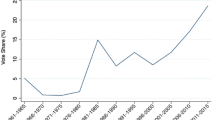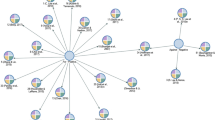Abstract
Political polarisation is a pressing political issue, as it can worsen democracy and has been rising in many countries in the past two decades. However, the exact scope of the problem is unclear, because conflicting measurements and conceptualisations have created disagreement about which countries are polarised. Scholars usually only measure one type of polarisation, even though multiple types are salient to the concept. Furthermore, little comparative data are available that measure multiple types of political polarisation simultaneously. This article introduces the comparative political polarisation index (CPPI), which provides a comparative measure of political polarisation that incorporates multiple dimensions of polarisation. This article first conceptualises political polarisation as a four-dimensional concept, operating through ideological and affective aspects and at the mass and elite levels. Then, it creates a comparative index that uses cross-national surveys and party manifesto data to measure all four types in more than 100 countries and over 25 years. This article finds that polarisation has not uniformly risen; only elite affective polarisation rose in this time period. Both types of ideological polarisation stayed stable, and mass affective polarisation decreased. These results encourage a closer look at the relationship between different types of polarisation and specify causes and solutions focused around particular types, rather than viewing political polarisation as uniform.











Similar content being viewed by others
References
Abramowitz, A., and K. Saunders. 2005. ‘Why Can’t We All Just Get Along? The Reality of a Polarized America’ the Forum. https://doi.org/10.2202/1540-8884.1076.
Afrobarometer (2020) Afrobarometer Data, Rounds 2–7, available at http://www.afrobarometer.org, accessed 20 January 2022.
Aydın-Düzgit, S. 2019. The Islamist-Secularist Divide and Turkey’s Descent Into Severe Polarization. In Democracies Divided: The Global Challenge Of Political Polarization, ed. T. Carothers and A. O’Donohue, 17–37. Washington, D.C.: Brookings Institution Press.
Bakker, R., et al. 2015. Measuring party positions in Europe: The Chapel Hill expert survey trend file, 1999–2010. Party Politics 21 (1): 143–152.
Bakker, R. et al. (2020) ‘1999−2019 Chapel Hill Expert Survey Trend File’, version 1.2, available at https://www.chesdata.eu/1999-2019chestrend, accessed 20 January 2022.
Barber, M., and N. McCarthy. 2015. Causes and consequences of polarization. In Solutions to political polarization in America, ed. N. Persily, 15–58. New York: Cambridge University Press.
Boxell, L., Gentzkow, M., and Shapiro, J. M. (2020) ‘Cross-Country Trends in Affective Polarization’, available at https://ideas.repec.org/p/nbr/nberwo/26669.html, accessed 20 January 2022.
Carothers, T., and A. O’Donohue, eds. 2019. Democracies Divided: The Global Challenge of Political Polarization. Washington, D.C.: Brookings Institution.
Coppedge, M. et al. (2022a) ‘V-Dem Codebook v12’, Varieties of Democracy (V-Dem) Project, available at https://www.v-dem.net/static/website/img/refs/codebookv12.pdf, accessed 23 June 2022.
Coppedge, M. et al. (2020) ‘V-Dem [Country–Year/Country–Date] Dataset’, version 11.1, available at https://www.v-dem.net/vdemds.html, accessed 20 January 2022.
Coppedge, M. et al. (2022b) ‘V-Dem Methodology v12’, Varieties of Democracy (V-Dem) Project available at https://www.v-dem.net/static/website/img/refs/methodologyv12.pdf, accessed 23 June 2022.
Dalton, R.J. 2008. The Quantity and the Quality of Party Systems. Comparative Political Studies 41 (7): 899–920. https://doi.org/10.1177/0010414008315860.
Fiorina, M. (2014) Americans have not become more politically polarized, available at https://www.washingtonpost.com/news/monkey-cage/wp/2014/06/23/americans-have-not-become-more-politically-polarized/, accessed 20 January 2022.
Grechyna, D. 2016. On the Determinants of Political Polarization. Economics Letters 144: 10–14. https://doi.org/10.1016/j.econlet.2016.04.018.
Hetherington, M.J. 2009. Review Article: Putting Polarization in Perspective. British Journal of Political Science 39 (2): 413–448. https://doi.org/10.1017/s0007123408000501.
Hobolt, S., T.J. Leeper, and J. Tilley. 2020. Divided by the vote: Affective polarization in the wake of the Brexit referendum. British Journal of Political Science 51 (4): 1476–1493. https://doi.org/10.1017/S0007123420000125.
Inglehart, R. et al. (eds.) (2020) ‘World Values Survey: Waves 2–7’, available at https://www.worldvaluessurvey.org/WVSContents.jsp, accessed 20 January 2022.
Iyengar, S., and S.J. Westwood. 2015. Fear and Loathing across Party Lines: New Evidence on Group Polarization. American Journal of Political Science 59 (3): 690–707. https://doi.org/10.1111/ajps.12152.
Iyengar, S., et al. 2019. The Origins and Consequences of affective polarization in the United States. Annual Review of Political Science. https://doi.org/10.1146/annurev-polisci-051117-073034.
Kekic, L. (2007) The Economist Intelligence Unit’s Index of Democracy, available at https://www.economist.com/media/pdf/DEMOCRACY_INDEX_2007_v3.pdf, accessed 20 January 2022.
Krasa, S., and M. Polborn. 2014. Policy Divergence and Voter Polarization in a Structural Model of Elections. The Journal of Law and Economics 57 (1): 31–76. https://doi.org/10.1086/675237.
Latinobarómetro (2018) Latinobarómetro: 1995–2018, available at https://www.latinobarometro.org/latContents.jsp, accessed 20 January 2022.
Lauka, A., J. McCoy, and R.B. Firat. 2018. Mass Partisan Polarization: Measuring a Relational Concept. American Behavioral Scientist 62 (1): 107–126. https://doi.org/10.1177/0002764218759581.
Lelkes, Y. 2016. Mass Polarization: Manifestations and Measurements. Public Opinion Quarterly 80 (S1): 392–410. https://doi.org/10.1093/poq/nfw005.
Lelkes, Y. 2018. Affective Polarization and Ideological Sorting: A Reciprocal, Albeit Weak, Relationship. The Forum 16 (1): 67–79. https://doi.org/10.1515/for-2018-0005.
Levendusky, M., and N. Malhotra. 2016. Does media coverage of partisan polarization affect political attitudes? Political Communication 33 (2): 283–301. https://doi.org/10.1080/10584609.2015.1038455.
Lupu, N. 2015. Party Polarization And Mass Partisanship: A Comparative Perspective. Political Behavior 37 (2): 331–356. https://doi.org/10.1007/s11109-014-9279-z.
Mair, P. (2006) Ruling the Void: The Hollowing of Western Democracy, New Left Review, 42: 25–51, available at https://newleftreview.org/issues/ii42/articles/peter-mair-ruling-the-void, accessed 23 June 2022.
McCarthy, N. (2014, January 8) What We Know and Don’t Know About Our Polarized Politics, available at https://www.washingtonpost.com/news/monkey-cage/wp/2014/01/08/what-we-know-and-dont-know-about-our-polarized-politics/, accessed 23 June 2022.
McCoy, J., T. Rahman, and M. Somer. 2018. Polarization and the Global Crisis of Democracy: Common Patterns, Dynamics, and Pernicious Consequences for Democratic Polities. American Behavioral Scientist 62 (1): 16–42. https://doi.org/10.1177/0002764218759576.
Pasteels, J. (2013) Review of best practice methodologies for imputing and harmonising data in cross-country datasets, available at http://ilo.org/wcmsp5/groups/public/---dgreports/---stat/documents/genericdocument/wcms_389375.pdf, accessed 20 January 2022.
Pemstein, D., et al. 2022. ‘The V-Dem Measurement Model: Latent Variable Analysis for Cross-National and Cross-Temporal Expert-Coded Data’, V-Dem 21, 7th ed. University of Gothenburg: Varieties of Democracy Institute.
Persily, N. 2015. Introduction. In Solutions to Political Polarization in America, ed. N. Persily, 3–14. Cambridge University Press.
Polk, J., et al. 2017. Explaining the salience of anti-elitism and reducing political corruption for political parties in Europe with the 2014 Chapel Hill Expert Survey data. Research and Politics. https://doi.org/10.1177/2053168016686915.
Sartori, G. 1976. Parties and Party Systems: A Framework For Analysis, vol. I. Cambridge: Cambridge University Press.
Schmitt, J. (2016) ‘How to Measure Ideological Polarization in Party Systems’, in ECPR Graduate Student Conference; Tartu, Estonia. Available at https://ecpr.eu/Filestore/paperproposal/180d1ef3-fd2c-4fd4-8532-df969463c71a.pdf, accessed 20 January 2022.
Skytte, R. 2020. Dimensions of Elite Partisan Polarization: Disentangling the Effects of Incivility and Issue Polarization. British Journal of Political Science 51 (4): 1–19. https://doi.org/10.1017/S0007123419000760.
Solís, M. (2019) Japan’s consolidated democracy in an era of populist turbulence, available at https://www.brookings.edu/wp-content/uploads/2019/02/FP_20190227_japan_democracy_solis.pdf, accessed 20 January 2022.
Somer, M. 2019. Turkey: The Slippery Slope From Reformist To Revolutionary Polarization And Democratic Breakdown. The ANNALS of the American Academy of Political and Social Science 681 (1): 42–61. https://doi.org/10.1177/0002716218818056.
Stanig, P. (2011) ‘Measuring Political Polarization in Comparative Perspective’, in APSA 2011 Annual Meeting; 1–4 September; Seattle, USA. Available at https://ssrn.com/abstract=1903475
The Comparative Study of Electoral Systems (2020) ‘CSES Modules 2–5 [dataset and documentation]’, available at https://cses.org/data-download/download-data-documentation/, accessed 20 January 2022.
Vegetti, F. 2019. The Political Nature of Ideological Polarization: The Case of Hungary. The ANNALS of the American Academy of Political and Social Science 681 (1): 78–96. https://doi.org/10.1177/0002716218813895.
Hussak van Velthem Meira, R. (2019) ‘Divided Brazil? An analysis of Brazilian’s political attitude’, Master Thesis, University of California San Diego, available at https://escholarship.org/uc/item/1c82h39b, accessed 20 January 2022.
Volkens, A., et al. 2020. ‘The Manifesto Data Collection, Manifesto Project (MRG/CMP/MARPOR). Version 2020b. https://doi.org/10.25522/manifesto.mpds.2020b.
Westwood, S.J., et al. 2017. The tie that divides: Cross-national evidence of the primacy of partyism. European Journal of Political Research 57 (2): 333–354. https://doi.org/10.1111/1475-6765.12228.
Author information
Authors and Affiliations
Corresponding author
Additional information
Publisher's Note
Springer Nature remains neutral with regard to jurisdictional claims in published maps and institutional affiliations.
Supplementary Information
Below is the link to the electronic supplementary material.
Rights and permissions
Springer Nature or its licensor (e.g. a society or other partner) holds exclusive rights to this article under a publishing agreement with the author(s) or other rightsholder(s); author self-archiving of the accepted manuscript version of this article is solely governed by the terms of such publishing agreement and applicable law.
About this article
Cite this article
van der Veen, O. Political polarisation compared: creating the comparative political polarisation index. Eur Polit Sci 22, 260–280 (2023). https://doi.org/10.1057/s41304-022-00400-x
Accepted:
Published:
Issue Date:
DOI: https://doi.org/10.1057/s41304-022-00400-x




